Меню
Соціальні мережі
Розділи
Jan. 15, 2025, 7:04 p.m.
Consumer sentiment and financial results: key economic results of 2024
This article also available in English308

Photo: icps.com.ua
It is obvious that the war, which has been going on for almost three years, has affected all spheres of life in Ukraine and Ukrainians. In addition to the obvious direct risks to the lives and health of our citizens, the war poses very serious economic risks. Experts of the Center for Economic Strategies have prepared a study based on the results of 2024, we have selected five key indicators.
Foreign financial assistance
Since the beginning of the full-scale invasion, all of Ukraine's own budget revenues have been used to finance defense; such expenditures account for about half of the budget. All civilian expenditures of the state budget are financed by foreign financial assistance - in 2025, the need for such external financing is 38.4 billion dollars.
In December, foreign financial assistance to Ukraine reached a record high for the entire period of the full-scale war - $9.3 billion. Ukraine received €4.1 billion from the EU under the Ukraine Facility, a $1.1 billion loan tranche from the IMF, $1.9 billion from Japan, $483 million from the UK, a $465 million grant from the US, and a $20 million loan from the World Bank.
For the first time, Ukraine also received funds secured by the proceeds of frozen assets of the Russian Federation: "The United States has given us a billion dollars in grants. This is the first tranche of 20 billion from the United States, which is part of a 50 billion financial support package.
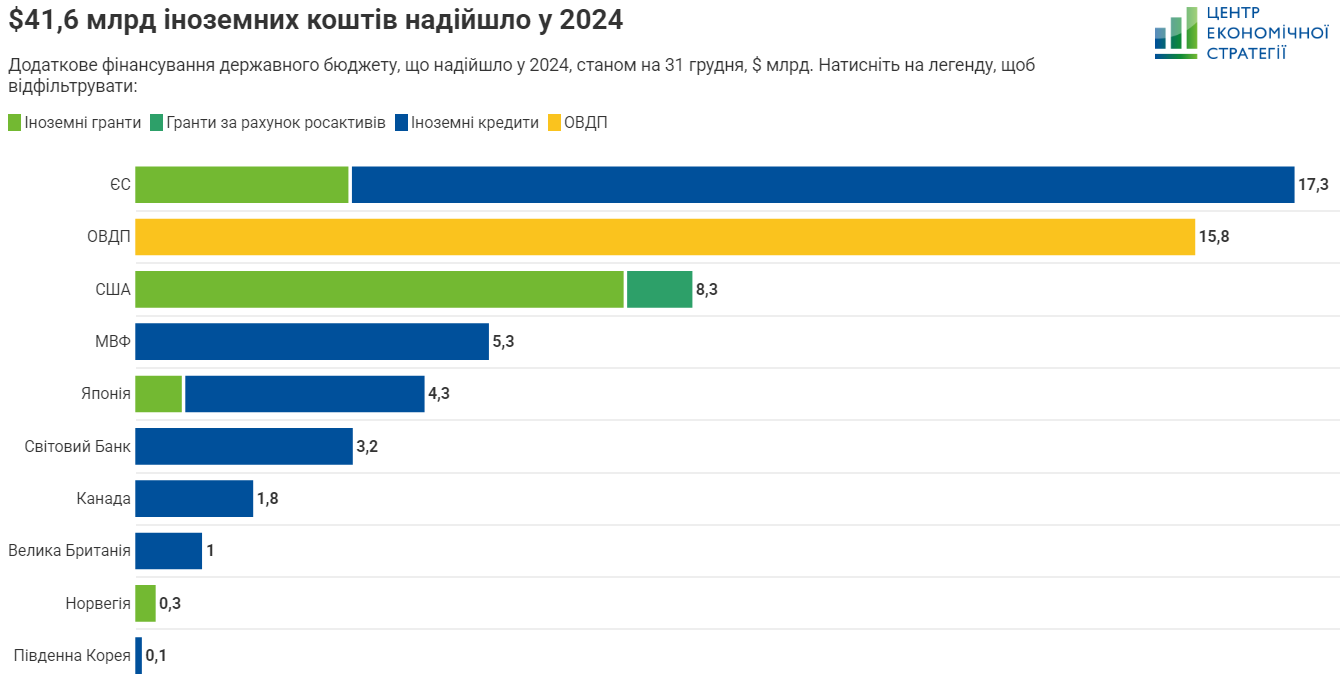
Image: Center for Economic Strategy
Foreign aid covered 75% of the additional needs of the state budget for 12 months of 2024. Foreign financing was not enough to fully cover the financial needs for this period, but this was expected. Domestic government bonds were the main source of covering the deficit.
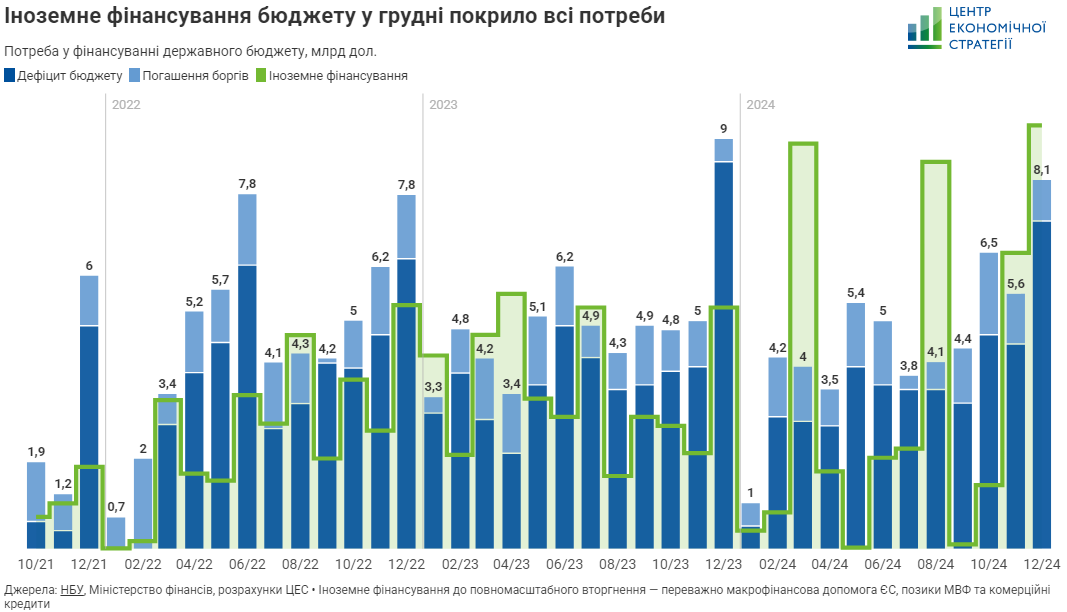
Image: Center for Economic Strategy
Fiscal policy
Tax revenues to the state budget in November reached UAH 158.2 billion, an increase of 38.5% compared to November last year. Consumption taxes increased by 41% compared to November 2023, but the 4-month growth trend has stopped.
The Center for Economic Strategy recorded a significant increase in VAT refunds during the year, with the last two months of refunds exceeding UAH 15 billion. Another concern for the researchers was the continued underperformance of the Customs Service's revenue plan (87% in October and 79% in November).
The President signed a package of laws on tax increases. MPs amended the Tax Code to postpone the effective date of the military tax for individual entrepreneurs to January 1, 2025.
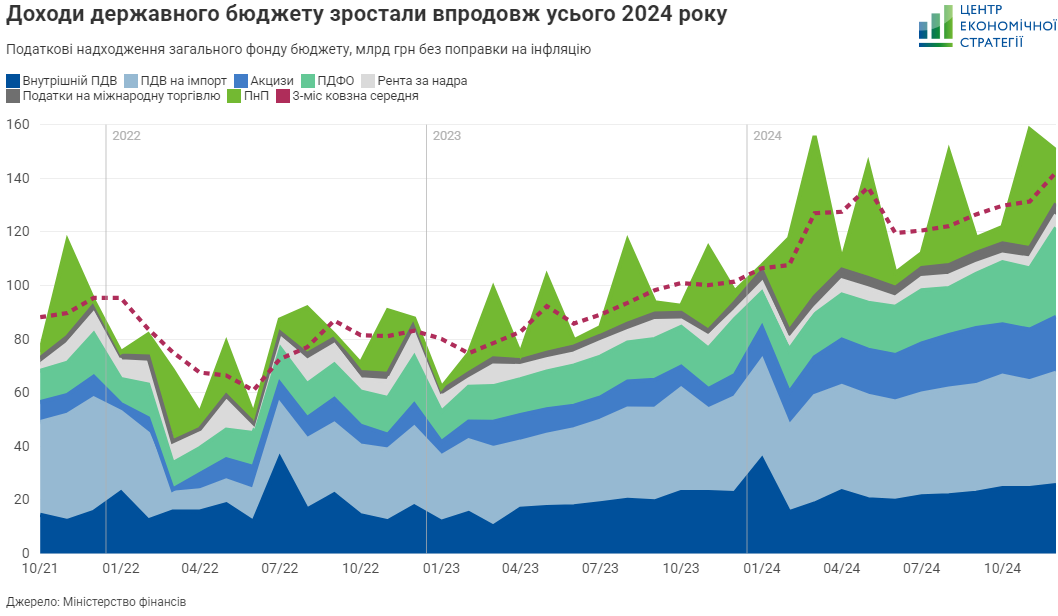
Image: Center for Economic Strategy
State budget expenditures, excluding logistical military assistance, reached UAH 2,977 billion in the first 9 months of 2024, up only 5.4% year-on-year. Defense and security expenditures reached UAH 1,475 billion in 9M2024, with September's UAH 166.7 billion remaining at the same level for the 4th consecutive month. Debt service expenditures in September were low at only UAH 13 billion.
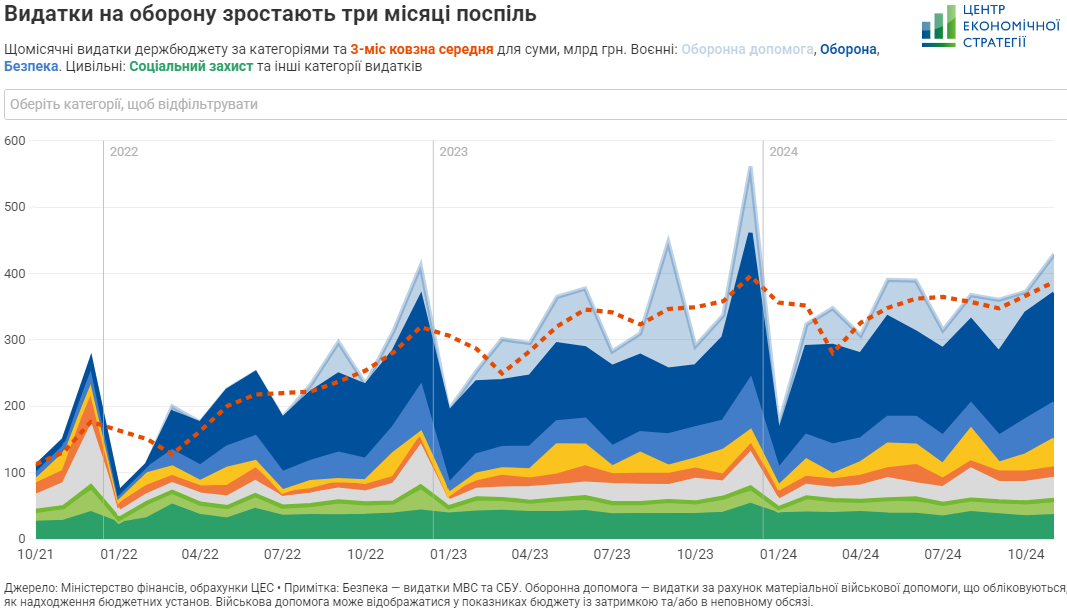
Image: Center for Economic Strategy
Foreign trade
According to preliminary NBU data, in November 2024, the balance of goods and services was negative: minus $3 billion. Imports of goods in November ($6 billion) exceeded exports of goods ($3.4 billion), and imports of services ($1.9 billion) exceeded exports of services ($1.4 billion).
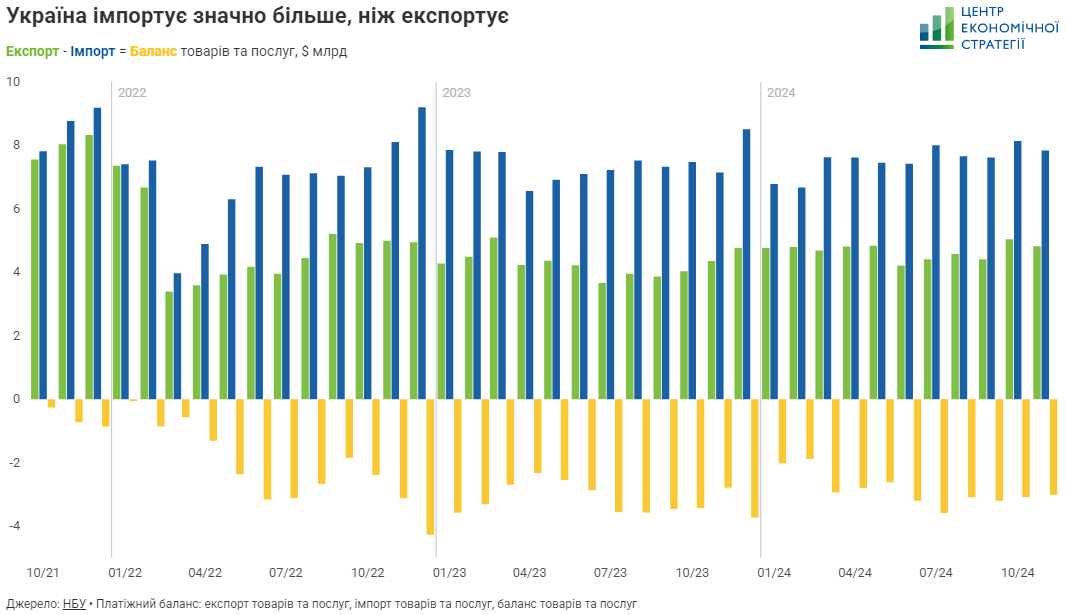
Image: Center for Economic Strategy
Energy.
The researchers emphasize that Russians continue to attack the Ukrainian energy system to cause as much destruction as possible and prolonged power outages. However, Ukrainian power engineers continue to repair all the damage and build up the defense of important facilities. Thanks to these efforts, Ukraine entered 2025 with minimal or no outages for household and industrial consumers. The situation even allows for commercial exports of electricity during certain hours: this helps to balance the system and generates additional revenue for energy companies.
Commercial electricity imports remain much higher than exports. As a result, net exports (the difference between exports and imports) were negative throughout December.
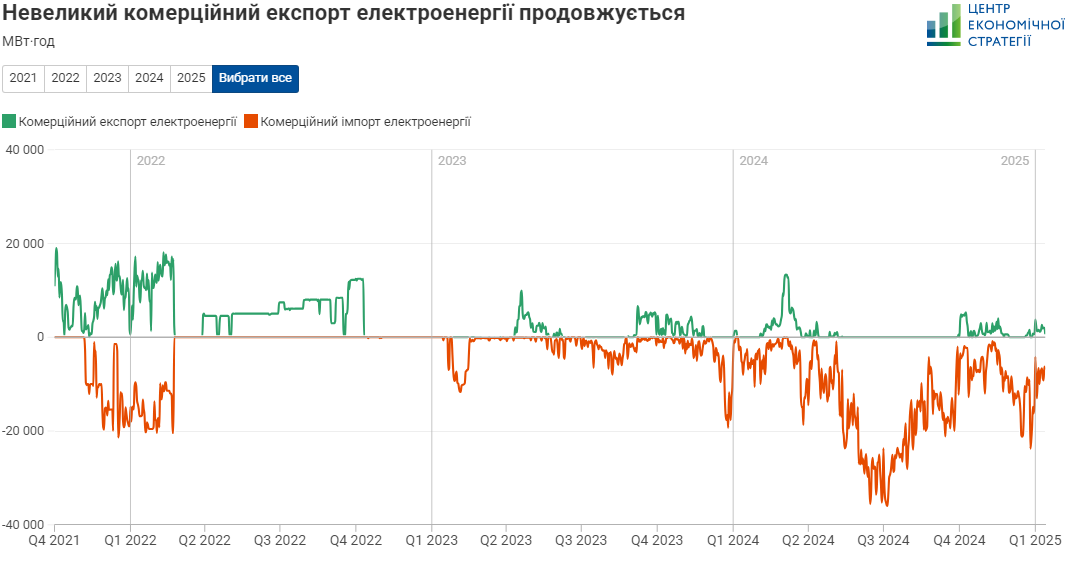
Image: Center for Economic Strategy
Economic expectations of Ukrainians are improving
In December 2024, the Info Sapiens Consumer Confidence Index was 71 points, a further slight improvement compared to previous months. An index of less than 100 means that negative consumer sentiment prevails among citizens. The components of the Consumer Confidence Index are the Index of Economic Expectations (84.2 in December) and the Index of Current Situation (51.5 in December).
The research agency Info Sapiens specializes in conducting public opinion research, behavioral measurement and analysis of data from secondary sources. Info Sapiens adheres to the ICC/ESOMAR research standards. Info Sapiens team members are members of Ukrainian and international professional associations and unions: Sociological Association of Ukraine (SAU), International Sociological Association (ISA), European Society for Opinion and Marketing Research (ESOMAR), Association for the Study of Nationalities (ASN), International Political Science Association (IPSA), American Political Science Association (APSA), International Network for Social Network Analysis (INSNA).
At the beginning of the full-scale war, consumer sentiment soared despite the deterioration of the real economic situation of consumers: Ukrainians had very optimistic expectations about the future. Then this corridor of optimism gradually narrowed, and the situation slowly returned to pre-war levels. However, in November 2024, the dynamics changed: the self-assessment of the current situation of Ukrainians deteriorated, while expectations for the future began to improve. This may be due to Donald Trump's victory in the US presidential election and the hope for a quick end to the war.
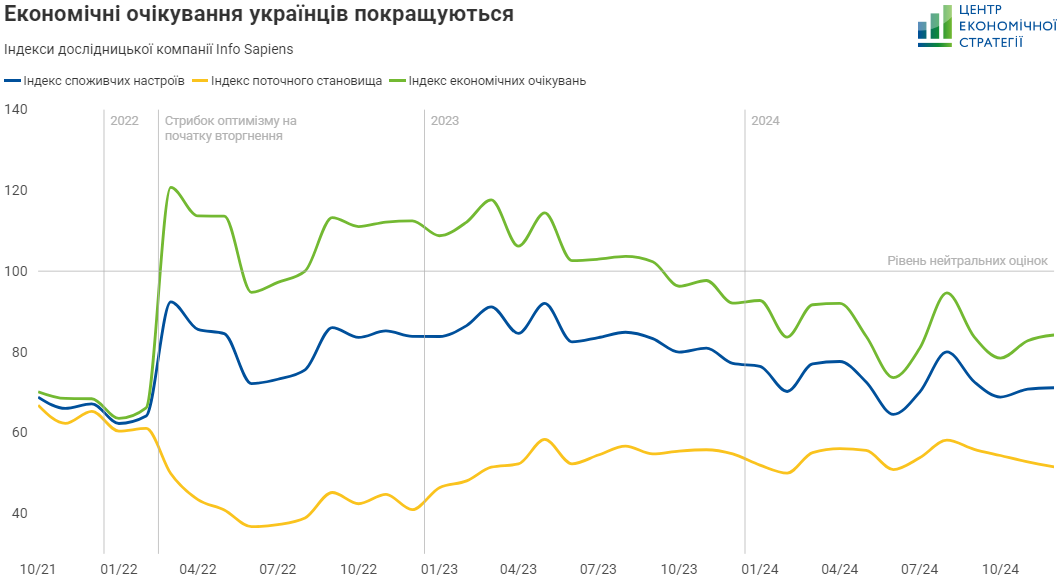
Image: Center for Economic Strategy
The war has had a significant impact on Ukraine's economy, forcing it to focus all of its resources on defense and to finance civilian spending with record international aid. Despite the budget deficit, difficulties in foreign trade, and constant attacks on energy infrastructure, Ukraine has managed to maintain macroeconomic stability, gradually restore the energy system, and even improve consumer expectations. These results demonstrate the resilience of the economy in times of war and the importance of international support.









